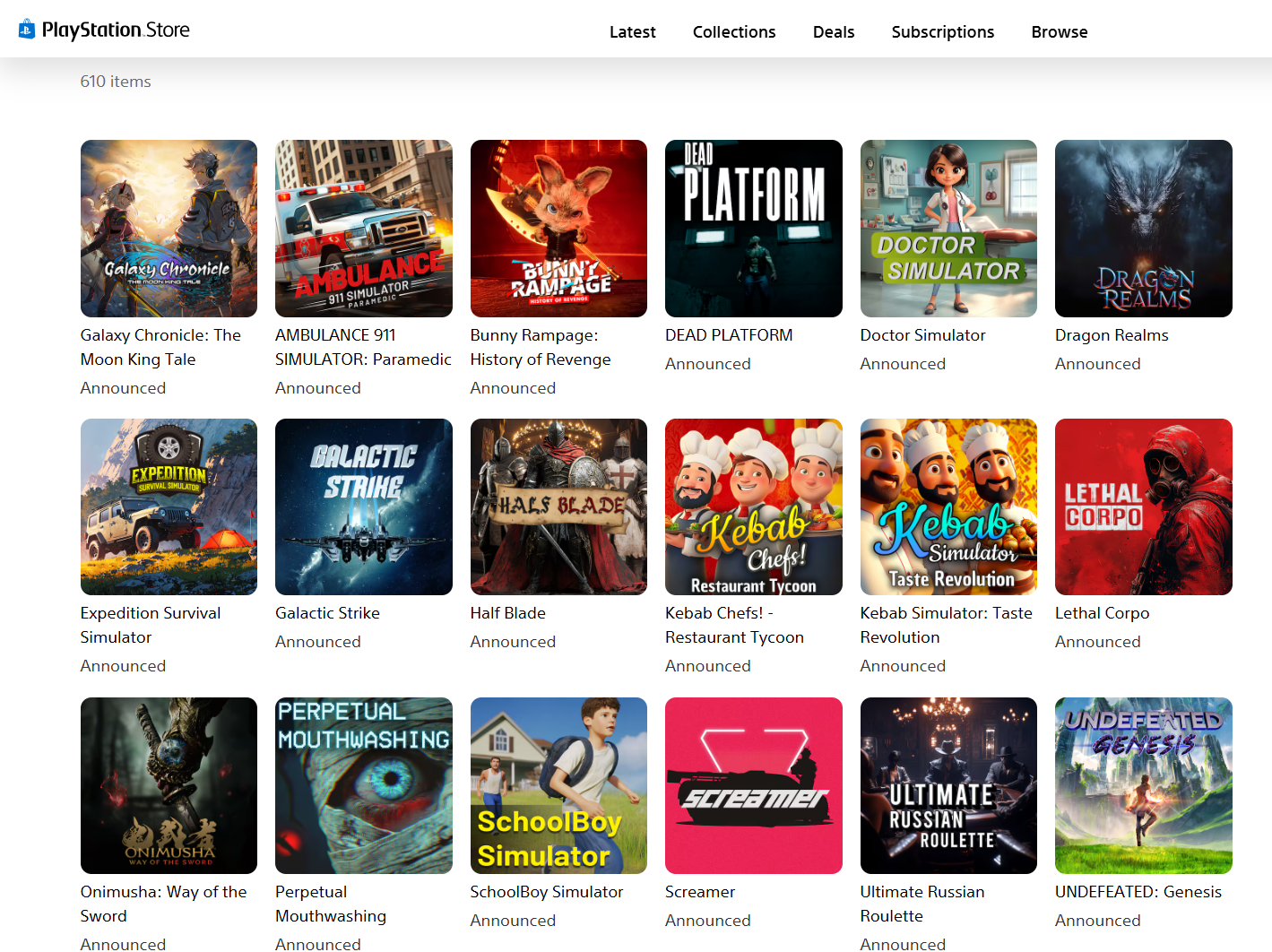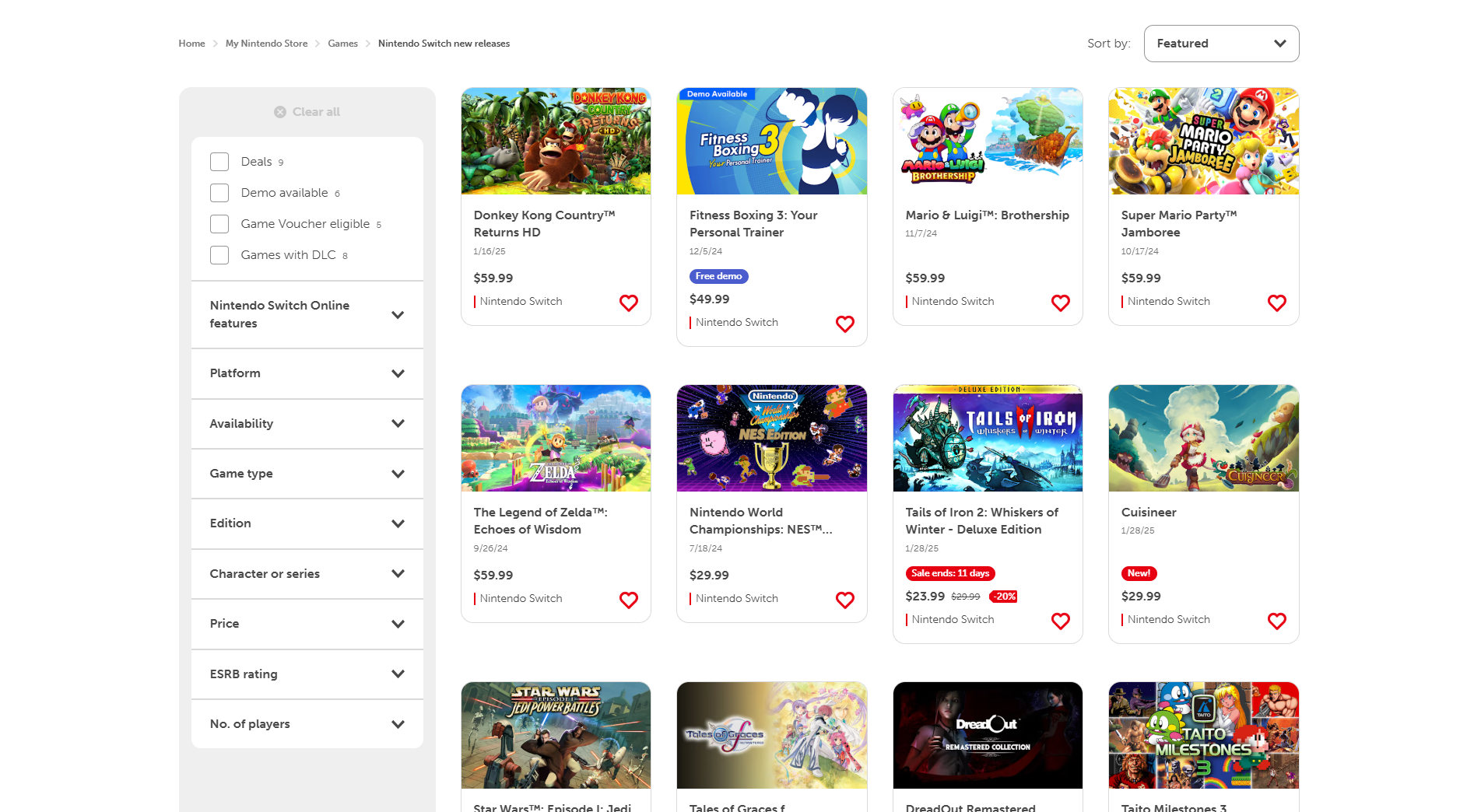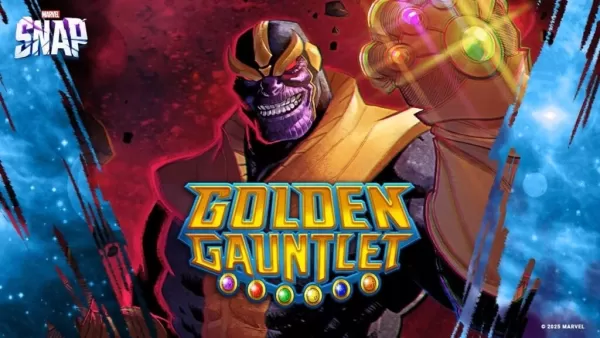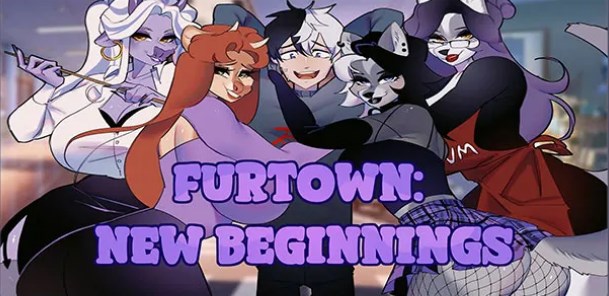There's been a peculiar trend on the PlayStation Store and Nintendo eShop over recent months, where users have noticed an influx of what they've dubbed "slop." Both Kotaku and Aftermath have shed light on this issue, particularly highlighting how the eShop has been flooded with games that employ a mix of generative AI and deceptive store pages to lure players into buying low-quality, misleading products. This problem has also made its way to the PlayStation Store, notably affecting the "Games to wishlist" section with an array of odd-looking titles.
These games aren't just your typical underwhelming releases; they're part of a noticeable surge of similar-looking products that are overshadowing other content. The so-called "slop" games primarily consist of simulation games, often on perpetual sale, that mimic themes and sometimes even outright steal concepts and names from well-known titles. They often feature hyper-stylized art and screenshots that seem to be generated by AI, yet in reality, the games do not match the visuals or gameplay promised on the storefront. They're usually riddled with bugs, poor controls, and minimal features, offering little in terms of engaging content.
What's more alarming is that, as pointed out by various users, these games are churned out by a small handful of companies. Investigations by YouTube creator Dead Domain have revealed that these entities are notoriously difficult to track down and hold accountable, often lacking substantial public presence and frequently changing their names to avoid scrutiny.
Amidst growing user frustration, there's a call for tighter regulation on these digital storefronts to curb the proliferation of "AI slop." This demand is intensified by ongoing issues with the technical performance of Nintendo's eShop, which seems to be slowing down as it struggles to manage the influx of new games.
In an effort to understand this phenomenon, I delved into how these games end up on these platforms, why PlayStation and Nintendo are particularly affected, and why other platforms like Steam and Xbox remain relatively untouched by this issue.
The Magical World of Cert
I consulted eight individuals involved in game development and publishing, all of whom preferred anonymity due to concerns over platform holder repercussions. They shared insights from their recent experiences in releasing games across Steam, Xbox, PlayStation, and Nintendo Switch, shedding light on why some stores are more prone to "slop" than others.
The process of getting a game onto any of these major platforms generally begins with a developer or publisher pitching their project to gain access to development portals and, for consoles, devkits. They then complete forms detailing the game's features, such as whether it's single- or multi-player, its connectivity requirements, and compatible controllers. The next step is "certification" or "lotcheck," where the platform holder ensures the game meets technical standards, such as how it handles corrupted saves or controller disconnections. While Steam and Xbox publish some of their requirements, Nintendo and Sony keep theirs confidential.
This process also verifies that games comply with legal standards and are consistent with their ESRB ratings, with platform holders being particularly vigilant about age ratings. Contrary to common belief among gamers, certification isn't a QA check but rather a verification that the game's code aligns with hardware specifications.
If a game passes certification, it's ready for release. If not, it must be resubmitted with issues resolved. However, those I spoke with noted that platform holders often provide minimal feedback on how to fix submission failures, with Nintendo being particularly opaque about rejection reasons.
Front and Center
Regarding store pages, platform holders require developers and publishers to use screenshots that accurately reflect their games. However, there's no systematic process for verifying this. Store page reviews mainly ensure there are no competing images or incorrect language. One developer recounted an instance where a game had to resubmit screenshots because they inadvertently used PC visuals that were beyond the capabilities of the Nintendo Switch.
While Nintendo and Xbox review all store page changes before they go live, PlayStation does a single check near launch, and Valve only reviews pages initially. This allows for potential discrepancies between the initial submission and the final product. Furthermore, the standards for what constitutes an accurate representation are vague enough that many games can slip through unnoticed. Misleading screenshots usually result in a request to remove the content, with severe cases potentially leading to delisting or removal of developer approval.
Interestingly, none of the console storefronts have specific rules regarding the use of generative AI in games or store assets, though Steam does ask developers to disclose such use without restricting it.
Eshop to eslop
So why are Sony and Nintendo's stores being overrun with misrepresented, low-effort sim games with AI-generated store assets, while Xbox remains less affected? The answer lies in the approval processes. Nintendo, Sony, and Valve approve developers and publishers, allowing them to release multiple games once approved, provided they pass certification. In contrast, Xbox approves games on a case-by-case basis, making it less vulnerable to "slop."
Developers and publishers also pointed out that Nintendo's approval process makes it the easiest to exploit. Some companies manipulate sales and new releases by continuously releasing bundled games at discounted prices, pushing genuine titles down the list. On PlayStation, the "Games to Wishlist" section, sorted by release date, inadvertently promotes unreleased games with vague release windows, further exacerbating the issue.
While Steam hosts a significant number of similar games, its robust sorting and search options, along with a constantly refreshing new releases section, make it easier for users to find quality content. Nintendo, on the other hand, presents all new releases in an unsorted manner, contributing to the "slop" problem.
All Games Allowed
Users have been urging Nintendo and Sony to address storefront regulation to combat the flood of similar games. Despite reaching out to these companies for comment, no responses were received. Developers and publishers expressed skepticism about significant changes, particularly from Nintendo, though some hope the Nintendo Switch 2 might bring improvements.
Sony has previously addressed similar issues, as seen in a 2021 crackdown on "spam" content flooding the PlayStation Store. However, not everyone agrees that stricter platform regulation is the answer. Initiatives like Nintendo Life's "Better eshop" faced backlash for wrongly categorizing games, highlighting the challenges of implementing effective filters without harming legitimate indie titles.
One publisher expressed concern that overly stringent regulations might inadvertently target quality games, emphasizing that most developers aren't looking to deceive players. Another perspective offered sympathy for platform holders, recognizing the difficulty in distinguishing between various types of game submissions and the challenge of balancing between allowing subpar games and preventing cynical cash grabs.

The 'Games to Wishlist' section on the PlayStation Store at the time this piece was written.

Nintendo's browser storefront is...fine, honestly?








